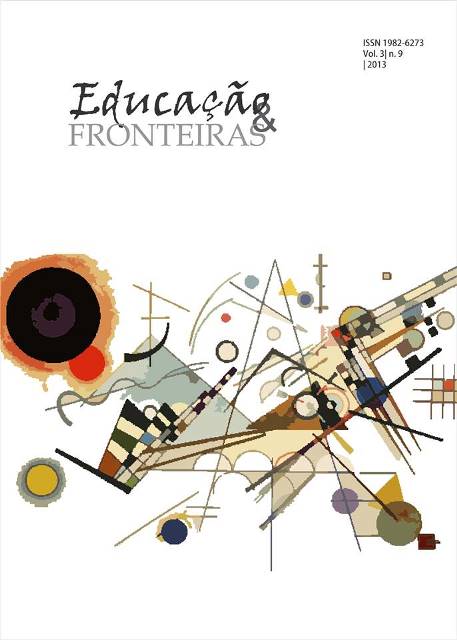Black clubs, associativism and history of education
Keywords:
Associativism. Black clubs. Education.Abstract
In this article, we present the first results of a research about the history of the Charitable, Cultural and Recreational Club called “September 28”, founded in the city of Jundiaí, SP, in 1897. It is the oldest black club in the state of São Paulo and one of the oldest in Brazil, still in activity today. Its trajectory, however, is much unknown, especially in regard to the educational and school initiatives taken in the early decades of the twentieth century. As main documents, I take the minutes of the club’s directory meetings found in the institution, followed by others sparse written records such as print materials and works by local historians. In the minutes, amid frequent discussions about money, parties and behaviors are notes relating to educational concerns raised by members of the club. The look for this documentation, still unpublished, is anchored in the discussion about the associativism of popular groups, especially the reflections on the theme from the contributions of the English historian E. P. Thompson.Downloads
References
AGUIAR, Márcio Mucedula. Os clubes negros e seu papel na constituição da identidade e do movimento negro: a história do Grêmio Recreativo e Familiar Flor de Maio em São Carlos, SP. InterAções, vol. 2, n.2, 2007, pp. 91-105.
BATALHA, Cláudio H. M. Cultura associativa no Rio de Janeiro da Primeira República. In. BATALHA, C., SILVA, F. T. da FORTES, A. (orgs.). Culturas de Classe. Campinas, SP: Editora da Unicamp, 2004.
______. Relançando o debate sobre mutualismo no Brasil: as relações entre corporações, irmandades, sociedades mutualistas de trabalhadores e sindicados à luz da produção recente. Mundos de Trabalho, Florianópolis, SC, vol. 2, n. 4, 2010, p. 12-22.
CAMPANHOLE, Adriano; SANTOS, Wanderley de; GICOVATE, Moisés. Aditamentos à história da fundação de Jundiaí. Jundiaí, SP: LiterArte., 1994.
CIPOLATO, Aldo. Jundiaí na história. Jundiaí, SP: Editora Japi, 1994.
DOMINGUES, Petrônio. Um ‘templo de luz’: Frente Negra Brasileira (1931-1937) e a questão da educação, Rev. Bras. Educ. [online], vol.13, n.39, 2008, pp. 517-534.
ESCOBAR, Giane Vargas. Clubes sociais negros: lugares de memória, resistência negra, patrimônio e potencial. Universidade Federal de Santa Maria, RS, Programa de Pós Graduação Profissionalizante em Patrimônio Cultural, (Dissertação de Mestrado), 2010.
JUNDIAÍ (Município). Secretaria Municipal de Planejamento e Meio Ambiente. Índios e africanos na Jundiaí colonial. Jundiaí:SMPMA/PMJ, 2002.
LONER, Ana Beatriz; GILL, Lorena Almeida. Classe, etnia e moralidade: estudo de clubes negros. Estudos Ibero-Americanos, Porto Alegre, v. 35, n. 1, pp. 145-162, jan./jun. 2009.
MAKINO, Mioko. Jundiaí, povoamento e desenvolvimento:1655-1854. Universidade de São Paulo, Programa de Pós Graduação em História, Faculdade de Filosofia, Ciências e Letras. Dissertação de mestrado, 1981.
MAZZUIA, Mário. Jundiaí através de documentos. Jundiaí, SP: Prefeitura do Município de Jundiaí, 1976.
NEGRO, Antônio Luigi; GOMES, Flávio. Além das senzalas e fábricas: uma história social do trabalho. Tempo Social, Revista de Sociologia da USP, v. 18, n. 1, 2006, pp. 217-240.
OLIVEIRA, Anna Luiza Cravinhos Mesquita de. Jundiaí, terra querida. 2. ed. Jundiaí, SP: LiterArte, 1992.
PINTO, Regina Pahim. Movimento Negro e educação do negro: ênfase na identidade. Cadernos de pesquisa, São Paulo: FCC, n. 86, agosto, 1993, pp. 25-38.
PIZA, Edith; ROSEMBERG, Fúlvia. Cor nos censos brasileiros. In: Revista USP, São Paulo, n. 40, dez./fev., 1998-1999, pp – p. 122-137.
THOMPSON, Edward Palmer. A formação da classe operária inglesa. Rio de Janeiro: Paz e Terra, 1987.









